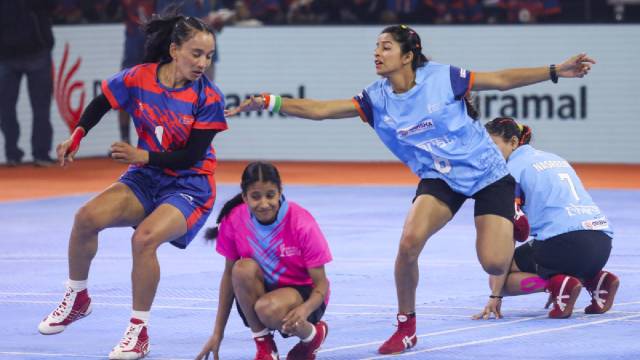Kho-kho nurtures Olympic dreams for 2036, a 100 years since it showed up as Demo sport at Berlin Games of 1936
Indian women trounce Nepal 78-40, while Indian men sky-dive their way to 54-36 win against Nepal in World Cup finals.
For an indigenous sport with modest global presence kho-kho is dreaming big and the government has thrown its weight behind it. The ongoing inaugural kho-kho World Cup here isn’t just the celebration of the sport’s journey from the dust bowls of rural India to the glitzy television-friendly surrounding of an slick indoor stadium but it is about the bigger ambition of taking it to Asian Games and a possible Olympic debut in 2036 the year India aspires to host the Summer Games.

Three state governments – UP, Maharashtra, Odisha – are among the inaugural World Cup’s two dozen sponsors. On board is the Rashtriya Swayamsevak Sangh (RSS) as well to promote ‘India’s game’. A gala opening ceremony was attended by the vice-president, ministers and lieutenant governors, Bollywood stars Salman Khan and Tiger Shroff as brand ambassadors, indoor night games under lights and live broadcast.
BJP leader Sudhanshu Mittal wears two hats, president of both the international IKKF as well as the Kho-Kho Federation of India (KKFI). “Kho Kho at the Olympics is the objective. I am confident of its inclusion at the Asian Games,” Mittal, in-charge of the sport in India since 2017, said.
India hosting the Kho-Kho World Cup and the country’s Olympics host aspirations are linked. It is one of the six sports the Mission Olympics Cell will recommend for inclusion in the 2036 Olympics, along with Twenty20 cricket, kabaddi, chess and squash.
Last week, the sports Minister Mansukh Mandaviya made a pitch for the ‘indigenous Indian sport’ to the Olympic Council of Asia (OCA). “Kho Kho, while being an indigenous Indian sport, is also gaining its popularity in various countries. Given the widespread popularity… I request your consideration of including Kho Kho as an event in the Asian Games,: Mandaviya wrote in a letter to Randhir Singh, the OCA president.
A demonstration sport at the 1936 Berlin Olympics, Kho Kho’s footprint has expanded from six member countries in 2020 to 55 in 2025. Thirty-nine teams from 23 countries — four apiece from Europe and Africa — are at the World Cup. The International Kho Kho Federation (IKKF) aims to expand the canvas to 90-plus countries to cross the Olympic entry threshold of 75.
Project globalisation of Kho Kho, according to Mittal, is backed not only by the central government, but also by the RSS. The World Cup of a game played at shakhas across the country is a watershed moment, Mittal, an RSS member since his early teens, said.
“We all got inspiration from the RSS. It is India’s game. We have been copying games from all the other countries. This is one game that has dared to go out and spread its wings. The Sangh being a nationalist organisation really helped in promoting the game and the World Cup,” Mittal said.
The organisers have pulled out all stops to bring foreign teams. With sponsors with deep pockets on board — the governments of Uttar Pradesh, Maharashtra and Odisha, and major Indian brands — the kitting, air tickets, accommodation, food and transportation for athletes is free of cost.
Brazil, a novice nation, has fielded its men’s team which was put together four months ago. For talent scouting, Brazil’s head coach Laura Doering turned to athletes from American football, flag football, sprinters and handball.
“I was looking at Brazilian athletes with speed and agility. We started to train on sand. There were four training camps (before the World Cup). We have some sponsors who are very curious about Kho-Kho and want to spread Kho-Kho to schools,” Doering said. There are plans afoot for a South American championship post the World Cup.
To help countries starting from scratch, eight qualified coaches were sent to different parts of the world by the IKKF before the World Cup. In early 2020, 62 potential coaches from 16 countries travelled to Delhi for training. But when Covid struck, they were stuck in a Karol Bagh hotel for nine months. MS Tyagi, the secretary (technical) of IKKF said the travel restrictions were a blessing in disguise.
“The camp was to be held at the Nehru Stadium. During Covid we trained them at a wooden hall at a Karol Bagh hotel. They went back and promoted the sport in countries like Australia, Poland and the Netherlands. In all 35 countries were keen on being at the World Cup but we had to stick to our continental quota rules,” Tyagi said.
The game of chasing and tagging opponents during a match that consists of two innings has moved from mud and grass to a court made of specialised mats. A shoe company and a designer, after taking inputs from players, are experimenting to create a suitable Kho-Kho shoe and Indian teams are wearing the latest prototype pair. The six-team Ultimate Kho Kho league is backed by top sponsors too.
“To globalise the game we had to modernise it. During the dummy league (prior to the Kho-Kho league) we realised that the court was too big for television viewing. The long shots didn’t capture the feel of the game. So we shortened the court. Creating the mat was a challenge because the mat requires a specific density so there is no impediment to the speed and there is enough softness to ensure there are no injuries,” Mittal said.
India men’s team captain Pratik Waikar believes the first World Cup will be a springboard. “Kho Kho has been transformed. It’s a dream come true to captain the Indian team in the Kho-Kho World Cup.” An Olympic-sized dream as well.
On Sunday, Waikar led India to a 54-36 triumph in the final against Nepal to be crowned inaugural champion. The Indians scored 26 and 28 in the first and third turn on the back of sensational sky dives, while Nepal managed 18 each in second and fourth. In all, India scored 247 points and ceded only 143.
Earlier the tone was set by the Indian women who has a stupendous 78-40 win over Nepal, as their two productive Turns yielded 34 and 44 points respectively. Nepal clinched 24 in Turn 2 but the Indian batch lasting 5 minutes and 14 seconds buried Nepal.
The Indian Express

